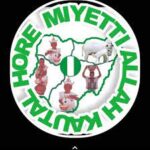Following a meeting comprising governors of the South-west states, the Miyetti Allah Cattle Breeders Association of Nigeria (MACBAN) and security and law enforcement agents last week in Akure, the Ondo State capital, an agreement was reached to de-escalate the tension that followed the quit order by the state government on herdsmen allegedly living illegally in the state’s forest reserves.
Under the agreement, night grazing and open grazing in the towns have been banned. Also grazing by under-age persons is not allowed. The peace agreement also provides for herders to be duly registered and documented by the state authorities.
The tension generated by the state’s quit order on the herdsmen reverberated most dangerously in neighbouring Oyo State, where a self-acclaimed activist, Sunday Adeyemi (also known as Sunday Igboho), led his supporters to enforce a quit order he had issued to the Fulani community in Ibarapa. According to reports lives were lost and properties destroyed following clashes between the supporters of Igboho and the Fulani settlers.
This incident resulted in a series of incendiary statements from ethnic-based groups which threatened to escalate the matter beyond tolerable levels.
The intervention of the federal and state governments, especially those in the South-west, traditional rulers across the country as well the security and law enforcement agencies helped to douse the situation and calm frayed nerves.
But the opportunity to go for a comprehensive, far-reaching plan to settle the issue must not be lost to complacency. The issues involved are very complex and require a lot of deft handling by all the stakeholders to arrive at a win-win solution.
First of all, it must be understood that not all herders are criminals as some reports tend to portray. It is therefore not proper to stigmatise the herders as being the only ones responsible for the banditry, kidnapping and other violent criminal activities taking place all over the country.
Secondly, while it is true that sometimes herders lead their livestock to destroy farmlands while grazing, we must also consider that the grazing reserves allotted to herders have in many cases been illegally converted to other uses by powerful individuals and state governments. There is also the issue of population increase which exerts pressure on the land available for various uses. Added to this is the factor of climate change which affects and limits the availability of land suitable for grazing forcing the herders to move southwards.
In trying to come to grips with the issue, government must separate the criminal elements from those that require genuine attention. Those that are using the issue as cover for banditry and other sorts of anti-social activities must of course be identified and made to face the law.
The issue of herders and farmers has been with us for quite some time now. There have been some efforts to address the matter by various governments over the years but somehow little or nothing seems to have come out of them. Whatever happened to the National Livestock Transformation Committee, headed by the Vice President, Professor Yemi Osinbajo, set up to address the issue?
It is time for government to implement the national programme for the resettlement of pastoralists on short, medium and long-term bases with time lines. There is a lot that Nigeria stands to gain in developing the livestock industry.
As an issue of national import, this calls for a concerted non-partisan approach involving all the stakeholders to the ultimate benefit of Nigeria as a whole.

 Join Daily Trust WhatsApp Community For Quick Access To News and Happenings Around You.
Join Daily Trust WhatsApp Community For Quick Access To News and Happenings Around You.


